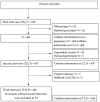Caffeine Intake throughout Pregnancy, and Factors Associated with Non-Compliance with Recommendations: A Cohort Study
- PMID: 36558543
- PMCID: PMC9785327
- DOI: 10.3390/nu14245384
Caffeine Intake throughout Pregnancy, and Factors Associated with Non-Compliance with Recommendations: A Cohort Study
Abstract
Maternal caffeine consumption is associated with adverse gestational outcomes. The aim of this study was to assess the intake of caffeine and factors associated with the non-adherence to caffeine intake recommendations in a cohort of 463 women before (T0) and in each trimester of gestation (T1, T2, and T3), by using validated questionnaires. Caffeine intake (median (mg/day), IQR) was 100.0 (181.1) at T0, 9.42 (66.2) at T1, 12.5 (65.6) at T2, and 14.0 (61.1) at T3 (p < 0.001). Non-compliance prevalence (intake > 200 mg/day) was 6.2% at T1, 4.2% at T2, and 2.7% at T3. Not being an active smoker at T1 (OR = 0.17; 95% CI 0.05−0.59) and T2 (OR = 0.22; 95% CI 0.09−0.52), adherence to the Mediterranean Diet at T1 (OR = 0.50; 95% CI 0.28−0.88) and T2 (OR = 0.39; 95% CI 0.15−1.02), and moderate physical activity at T1 (OR = 0.50; 95% CI 0.28−0.88) were inversely associated with caffeine consumption. Although caffeine intake may be considered low, intake prevalence increases throughout pregnancy. Although the main source of caffeine during pregnancy is coffee, attention must be also paid to the increasingly intake of chocolate, of which the effect during pregnancy is controversial. Smoking, non-adherence to a good quality diet, and light physical activity are associated with a higher caffeine intake and a lower compliance with caffeine intake recommendations. Perinatal dietary and lifestyle educational policies are needed.
Keywords: caffeine; compliance; lifestyles; pregnancy; recommendations.
Conflict of interest statement
The authors declare no conflict of interest.
Figures
Similar articles
-
Adherence to the Caffeine Intake Guideline during Pregnancy and Birth Outcomes: A Prospective Cohort Study.Nutrients. 2018 Mar 7;10(3):319. doi: 10.3390/nu10030319. Nutrients. 2018. PMID: 29518946 Free PMC article.
-
Associations of maternal caffeine intake with birth outcomes: results from the Lifeways Cross Generation Cohort Study.Am J Clin Nutr. 2018 Dec 1;108(6):1301-1308. doi: 10.1093/ajcn/nqy219. Am J Clin Nutr. 2018. PMID: 30339199
-
Maternal caffeine intake from coffee and tea, fetal growth, and the risks of adverse birth outcomes: the Generation R Study.Am J Clin Nutr. 2010 Jun;91(6):1691-8. doi: 10.3945/ajcn.2009.28792. Epub 2010 Apr 28. Am J Clin Nutr. 2010. PMID: 20427730
-
[Effects of coffee and caffeine on fertility, reproduction, lactation, and development. Review of human and animal data].J Gynecol Obstet Biol Reprod (Paris). 1994;23(3):241-56. J Gynecol Obstet Biol Reprod (Paris). 1994. PMID: 8051344 Review. French.
-
A meta-analysis of risk of pregnancy loss and caffeine and coffee consumption during pregnancy.Int J Gynaecol Obstet. 2015 Aug;130(2):116-22. doi: 10.1016/j.ijgo.2015.03.033. Epub 2015 May 14. Int J Gynaecol Obstet. 2015. PMID: 26026343 Review.
Cited by
-
Common questions and misconceptions about caffeine supplementation: what does the scientific evidence really show?J Int Soc Sports Nutr. 2024 Dec;21(1):2323919. doi: 10.1080/15502783.2024.2323919. Epub 2024 Mar 11. J Int Soc Sports Nutr. 2024. PMID: 38466174 Free PMC article. Review.
-
Common Questions and Misconceptions About Energy Drinks: What Does the Scientific Evidence Really Show?Nutrients. 2024 Dec 27;17(1):67. doi: 10.3390/nu17010067. Nutrients. 2024. PMID: 39796501 Free PMC article. Review.
-
The association between antenatal coffee consumption and preeclampsia: a systematic review and meta-analysis.Environ Health Prev Med. 2024;29:49. doi: 10.1265/ehpm.24-00149. Environ Health Prev Med. 2024. PMID: 39313394 Free PMC article.
References
MeSH terms
Substances
LinkOut - more resources
Full Text Sources
Medical



